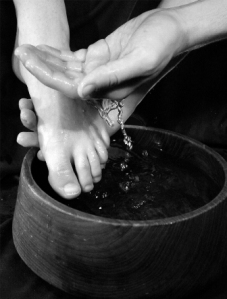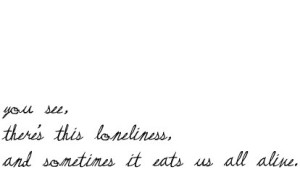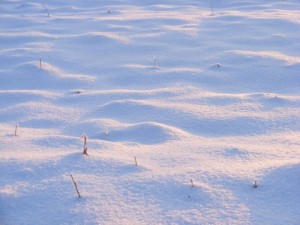
What is he doing?
The thought tears itself from my mind as I watch Jesus take off his outer garments and wrap a towel around his waist. I glance over at John; his eyes show his confusion, but his face is better concealed than my own. One by one I look at the others, and I see that they have as little understanding of what is going on as I do.
Jesus goes to a table, takes a pitcher of water, and slowly pours the liquid into a silver basin. His actions are steady, his face quiet, and no one speaks as the sound of pouring water fills the room. Unconsciously, I take a step back from the others.
Finally Andrew opens his mouth; I clamp my hand down upon his shoulder. In a moment of absolute clarity, I know that we are to be silent.
After what seems an eternity, Jesus puts the empty pitcher back upon the table. Then he takes a chair and sets it in front of the silver basin. Only now does he look up and meet our eyes. He reads our confusion, our hesitation. He walks over to John, gazes at him a moment, then puts his hand on his arm and leads him over to the chair. John searches Jesus’s gaze, then wordlessly sits down.
It is this next minute that I will never forget, not if I live to a thousand years old. It is branded upon my mind like lightning; when I think about it, even months later, it stings like a knife. It stings like love.
Jesus kneels down on the cold, dirty floor. Slowly, one by one, he takes off John’s leather sandals. He holds a grimy, dust-layered foot in his clean hands, and he trickles cold water upon it. I steal a glance at John’s face; it is closed, but then so are his eyes.
Jesus continues to pour water upon John’s foot, and the dirt falls from it like scales. When it is completely clean, Jesus takes the towel hanging upon his own side and uses it to wipe the foot dry. He sets it carefully down and starts upon John’s other foot. Again he trickles water upon the foot, and again the dirt is cleansed away. One more time he dries it with his towel, and then he carefully places John’s sandals back on his feet. Jesus straightens now, looks at John, and then quietly helps him stand. John resumes his position with the rest of us, but his gaze upon Jesus now is searching.
There is a moment of stillness, and then Andrew steps forward. Jesus takes him by the arm and leads him to the chair. I see the same actions performed on John repeated on my own brother. I watch Jesus’s face this time, only his face, and I see a depth of love so profound that I cannot bear it…I cannot bear it. There is sorrow in that love, and it is beautiful.
One by one, Jesus washes our feet. After Andrew is James, and after James is Thaddeus, then Thomas, then James, Matthew, Simon, Philip, Bartholomew, and Judas. I see something in Judas’s face as Jesus washes his feet. It looks like fear. It looks like shame.
When Jesus has finished with Judas, he straightens again and leads him back to the rest of us. Then he looks at me. Without thinking, I take several steps backwards. Jesus does not move, but continues to gaze at me. I feel shaky, for reasons I can’t understand. I feel scared.
“Lord,” I say, breaking my own premonition that Jesus would speak before the rest of us. “Lord, do you wash my feet?”
Jesus says quietly, “What I am doing you do not understand now, but afterward you will understand.”
I am already shaking my head, not so much in disagreement as in denial. Jesus, this great teacher, taking on the role of a servant and washing my feet?
“No, Lord,” I say desperately, “You shall never wash my feet.”
I see the other disciples exchange glances; they are shocked at my words. I am too, but I am adamant. My pride is wounded. Does he really think I would let him degrade himself so much?
“If I do not wash you,” Jesus’s words slide through my thoughts like water through cracks in a wall, “you have no share with me.”
I feel as though I am struck by lightning. My wounded pride is replaced instantly with contriteness. “Lord, not just my feet, but my hands also, and my head!”
Jesus walks over to me now, and just as he did to the others, he takes me by the arm and guides me over to the chair. I sit down, and the chair is hard and unyielding. In contrast, Jesus’s hands as he unties my sandals are gentle. He removes my sandals, takes my left foot, and begins to wash it. The water is cold, shockingly so, and it awakens me again to the truth of what is happening, the frightening, undeniable truth: Jesus, our Master, is washing my feet. Something like pain pierces me in the heart, and I cannot look at him, I cannot look at him. Jesus is now drying my foot with the towel around his waist, leaning forward slightly to get the full reach of the cloth. He then takes my other foot and begins the whole process over. I watch the dirt fall away, I feel the same stab of pain, and then he is finished. With my sandals once again on my feet, I stand over and allow Jesus to lead me back to the others.
As I take my place again next to Andrew, I am undone.
I remember a year or two ago, Antioch was having a prayer night, and they were replicating this footwashing. It was the first time I’d ever seen anything like it. I remember a leader coming up to me and asking me if they could wash my feet, and I remember clearly the terror that I felt. I couldn’t have explained the emotion then, and I still can’t explain it now as I think about it. All I know is that the idea of being that surrendered, that vulnerable, scared me to no end. I shook my head again and again, and the leader gently left me alone.
In spite of this memory, or perhaps because of it, the scene of Jesus washing his disciple’s feet has a special meaning to me, and in particular, Peter’s reaction resonates with me. Though perhaps to a lesser extent, I understand how he felt when Jesus tried to wash his feet. I understand his fear, his wounded pride. I remember my own terror and I imagine how much greater the terror would have been if Jesus had been the one asking to wash my feet. I wonder if I would have the courage to tell him yes. I wonder if my fear would have won out on me.
The act of footwashing is one of service, one of humility, one of love. It was something that I could not understand a couple years ago, and something that I am only beginning to comprehend now. Jesus washed the feet of his disciples, and in doing so, he washes my own feet. I don’t deny the shame that fills me when I imagine that, but I also don’t deny the beauty of the thought. What kind of a man is this Jesus? I’ve lived 17 years in the faith, I thought I knew him, but something about this scene leaves me stranded again and again. What kind of a King would do what this man did? What kind of a Lord? What kind of a Lover…
Recently at the winter retreat, Antioch again went through the act of footwashing. Again I was terrified, and I nearly told the leader I could not do it. But as I stood in line and watched the other students getting their feet washed, students younger than me, students far less shameful than I felt, I understood that it is not just the person washing the feet who is being humbled, but the person being washed as well. Allowing myself to be washed is, in my mind, the epitome of vulnerability. It was that vulnerability that frightened me. I’m not sure what changed, that I let my small group leader wash my feet. Perhaps nothing changed; perhaps I just did not have the courage to say no. Regardless, it was a powerful experience, and even though the shame and fear was still there, it was an act of love performed by a person I love. And Jesus’s love for me became a little bit clearer that night.




